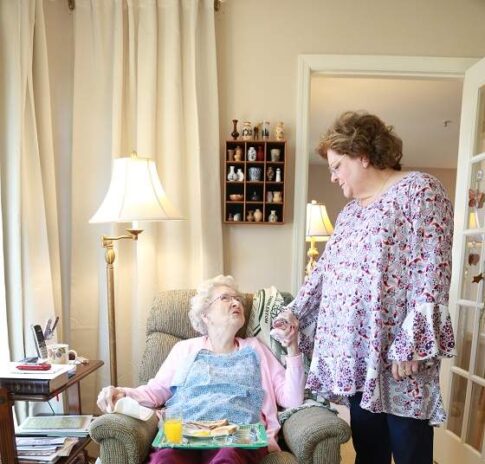Approximately 34.2 million Americans have provided unpaid care to an adult age 50 or older in the last 12 months [National Alliance for Caregiving, 2019]. Every day a new family caregiver becomes part of this large group of people dealing head-on with the tasks of helping their parents with daily living: personal hygiene, dressing, food preparation, walking and mobility, transportation, housekeeping, medication management and more.
If you are the family caregiver – whether you’re new to the role or not – we have compiled some advice to help you avoid 5 common mistakes when caring for your aging parents.
Mistake #1: Not getting their life (and yours) in order. Gather pertinent legal, financial and personal information and place everything in one folder in case you need it in an emergency or unexpected situation, including:
- Bank and investment accounts
- Estate documents like wills and trusts
- Funeral and burial plans
- Medical and insurance information
- Names and phone numbers of professional advisers
- Real estate documents
Mistake #2: Not asking for help: Caring for your elderly parents is tough. It can involve daily assistance with bathing, dressing, eating, cleaning the house and doing minor repairs. It can include laundry, shopping for groceries, preparing meals, transportation to and from doctor appointments, and more. This list is just a portion of the responsibilities a family caregiver may have, and it is a lot for one person to handle. Don’t be shy. Ask other family members to step in and help. Family caregivers often feel guilty about asking for help. However, the stress and strain from ongoing caregiving responsibilities can impact their health and the ability to provide the care their loved one needs.
Mistake #3: Not being hands-on with their medical care: Many new family caregivers have never had to navigate the healthcare system before. As a caregiver, you’re going to have to become more proactive about your loved one’s medical treatments and be an advocate for their well-being.
- Copy and store all your loved one’s relevant medical information in a notebook and bring it to every doctor appointment.
- Take notes and keep a record of what is being recommended at each appointment.
- Keep an up-to-date medication list.
- Learn as much as you can about the medical conditions of your loved one.
As your parent ages, their condition may change, and you may not be able to provide everything they need. Knowing what other resources are available in your local community, and what it takes to get them more advanced medical care, should be a long-term priority.
Mistake #4: Not taking care of the caregiver: When a member of the family decides to be the primary caregiver to their parents, it’s easy to forget that he or she needs time for her own personal activities and family…not to mention their own health! The extended family should ensure that the caregiver gets enough time off to rest and recharge. If other family members can’t step in to help, you can hire a professional caregiver. Everyone needs respite care to have short-term relief from their caregiving responsibilities, whether it’s for a few hours one afternoon or for several days.
Mistake # 5: Not planning for the realities that lie ahead: End-of-life care is something that few people like to think about, let alone discuss. It is a mistake to avoid the subject and it can have devasting consequences for the entire family if the topic is ignored. At a minimum, you should do the following:
- Call a family meeting when your parents are still healthy.
- Help your parents pull together all the necessary legal and financial documents into one location
- Name an executor or a personal representative to ensure that all wishes are carried out as written.
- Name beneficiaries to receive the property. A will should specify who receives specific “gifts of property,” or specific bequests, which include real estate, cash, and personal property.
- Specify what personal assets should be divided among beneficiaries; these need to be detailed in a will.
- Address all debts, expenses, and taxes. It’s helpful to include how final expenses are to be handled, such as funeral costs or inheritance and estate tax.
- Discuss any special instructions. This can include things like how one’s home should be maintained and cared for to arrange for someone to care for pets.
FirstLight Home Care works with families to help care for their aging loved ones and fill the gaps with a variety of in-home care services when you can’t be there, when you need a break, or when you’re still learning the best ways to meet a parent’s needs with dignity, respect, and love.
Other trending topics on our blog:
Six Mistakes Adult Children Make When Parents Are Aging and Sick
Questions to Ask Your Aging Parents
We are proud to CHAMPION the family caregiver, offering empathy, advice, and support for those who provide countless hours of care to their loved ones. At FirstLight Home Care we want to provide a helping hand, relieve some of the stress that comes with caregiving and give you back a few hours in your overwhelmingly busy day.
